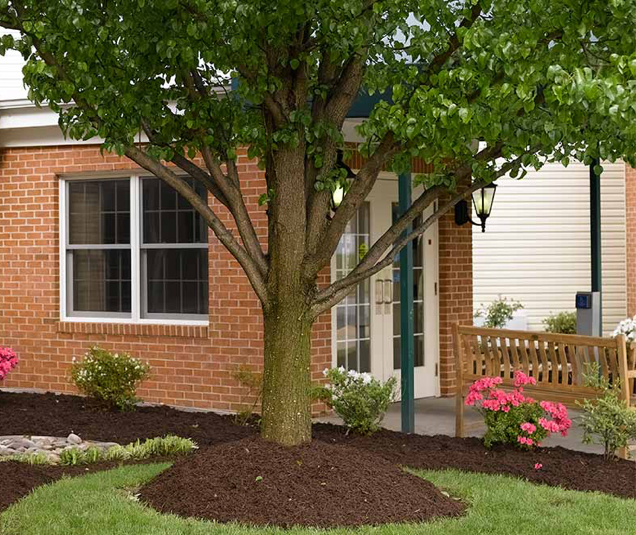Memory loss can be complicated, but your family has support options available. It’s all about knowing where to look and how to tell when it’s time to look into professional support. With the help of the right senior living community, you can give your loved one the care they deserve.
Assisted living can often help older adults in the earlier stages of memory loss. These communities are trained to help older adults in need of some daily support. Many communities also offer memory care services to help preserve your loved one’s quality of life.
When it comes to senior living, the right choice matters. Knowing when to transition from one to the other is key to giving your loved one the care they need.
Assisted Living: How Does It Work?
Sometimes, we all need some help. Many older adults deal with difficulties in their everyday lives. It could be due to mobility changes, medication, or any number of physical challenges. These changes are entirely natural, and it’s when assisted living becomes an excellent option.
Assisted living is designed to provide older adults with a balance of independence and support. Seniors can enjoy a comfortable living environment with convenient amenities that cater to their needs.
The goal is to help residents live independently while providing just enough support to make everyday life easier.
For those who are starting to experience mild cognitive decline, assisted living can help. It’s a place where seniors can thrive, enjoy social opportunities, and feel comfortable knowing help is available when needed.
Who Should Live in Assisted Living?
Assisted living is designed to promote independence every day. Ideal residents should need some support with daily tasks without needing round-the-clock advanced care.
It’s an option that honors autonomy while accommodating those who may struggle with cooking, cleaning, or managing medications.
If a person is living with mild cognitive decline or memory issues, assisted living can still give support. It’s an environment tailored to help them maintain their independence without putting them at risk in their daily lives.
However, if your loved one lives with significant cognitive decline, they may need more advanced care.
How to Tell If Someone Should Live in Assisted Living
A person should live in assisted living if they:
- Have difficulty managing medications or daily routines
- Deal with increased isolation and loneliness
- Have safety concerns, like forgetfulness or forgetting to eat
- Struggle with maintaining personal hygiene or daily tasks
These are all signs that a person would benefit from life in assisted living.
Can Someone with Memory Loss Live in Assisted Living?
Often, a person with mild memory loss can live comfortably in assisted living. These environments provide a structured routine and support with daily tasks, which can help reduce confusion and stress.
However, as memory loss progresses, the level of care required may exceed what assisted living can provide. In these cases, memory care can offer older adults appropriate and effective care.
Alternatives to Assisted Living
While assisted living can support those with mild cognitive decline, there are other options available. Memory care is one of the most common alternatives. It’s a lifestyle built entirely around helping seniors living with memory loss, cognitive decline, or dementia.
What’s Included in Memory Care?
Memory care offers a wide range of specialized services tailored to help those living with memory loss. Memory care goes beyond basic support to create a safe, secure, and supportive environment for older adults in need.

Personalized Care Plans
In memory care, each resident receives a personalized care plan developed by caregivers trained in cognitive care to meet their specific needs.
Their care plan takes into account the level of cognitive decline, physical health, and personal preferences. It gives the community a deep understanding of your loved one’s needs so they can tailor care to different situations.
Secure Environments
Security is a top priority in memory care. Secure entrances, exits, and safe living spaces are designed to prevent wandering and promote resident safety. The environment is also carefully structured to promote independence while reducing confusion.
Therapeutic Activities
Engaging in activities designed to stimulate memory and cognitive function is a vital part of memory care. These activities help keep the brain active and promote socialization, which can lead to significantly improved emotional and mental well-being.
Family Support Services
Memory care communities also offer family support services, including education, counseling, and support groups. These services help families understand the challenges their loved ones are facing and provide the tools they need to navigate the journey together.
How to Tell If a Person Should Move to Memory Care
As memory loss increases, your loved one’s everyday quality of life can change. That’s why watching for the early signs of cognitive decline is so important.
Watch for:
- Wandering or getting lost in familiar places
- Increased aggression or mood changes
- Difficulty with personal care, like grooming or bathing
- Forgetting to take medications or handle basic tasks
Don’t forget to reach out to the community if your loved one lives in assisted living. Your loved one’s caregivers can give you valuable insights. They may be able to transition your loved one to a new level of care within the community, minimizing disruptions while improving their care.
Find Senior Living in Salisbury, Maryland
Choosing the appropriate care for a loved one with memory loss is an important decision. Whether your loved one needs the supportive environment of assisted living or the specialized care of memory care, our team at Peregrine Senior Living is here to help.
In our community, we’re dedicated to giving your loved one a place to thrive. Between our lifestyle options, we’ll find a place for your loved one to call home. Schedule a tour with our team today to learn more about your options!













February is American Heart Month, a time to focus on caring for the muscle that keeps us moving and thriving. 🫀
We encourage residents to take heart-healthy steps every day: enjoying balanced meals, staying active, connecting socially, and taking moments to rest and recharge.
Together, we can make heart health a daily celebration of life and well-being.
peregrinesalisbury.com/ ... See MoreSee Less
0 CommentsComment on Facebook
Want to stay connected with what’s happening across our community?
Follow us on Instagram for updates, moments we love, and stories worth sharing.
Come join the community by following us via the link below ⬇️
www.instagram.com/peregrinesalisbury/ ... See MoreSee Less
0 CommentsComment on Facebook
“Cooking is love made edible.” - Unknown 🍕
Memory Care residents made personalized pizzas for National Pizza Day! ... See MoreSee Less
0 CommentsComment on Facebook
Happy hour with Benny Rosa ... See MoreSee Less
0 CommentsComment on Facebook
Like flowers, we can also choose to bloom." — The Goddess
Assisted Living Residents made tissue flowers 🌸 ... See MoreSee Less
0 CommentsComment on Facebook
This month, we celebrate the incredible achievements, resilience, and cultural richness of Black Americans who have shaped our history and continue to inspire our future.
We believe in honoring every story and embracing the diverse experiences that strengthen our community. May this month remind us all to listen, learn, and uplift—today and always.
peregrinesalisbury.com/ ... See MoreSee Less
0 CommentsComment on Facebook
... See MoreSee Less
0 CommentsComment on Facebook